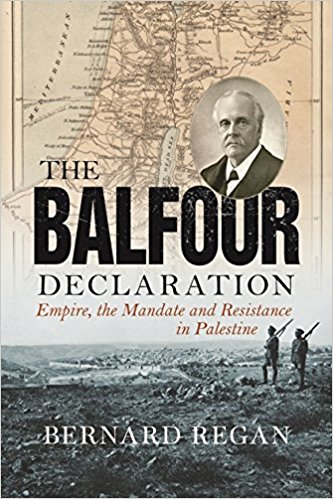The Balfour Declaration – Empire, the Mandate and Resistance in Palestine
A book review

With the 100th anniversary of the Balfour Declaration, a number of books have been published covering the topic in different ways. Bernard Regan’s The Balfour Declaration adds to this library, tending to be within an academic political presentation. In his acknowledgements, Regan writes that his “academic undertaking” becomes a “hopefully more accessible publication.” He succeeds with that, but as his sources are mainly British government documents of one form or another, it remains an academic read. It is not an anecdotal history, nor one that reveals the personalities behind the players in the game, but one that records the imperial intentions of the British government (and others within their interactions with the British).
Regan recognized that “Zionism…became an important adjunct of British imperialist strategy in the Near East.” Throughout the work resides the tension between the Wilsonian ideal of self-determination encountering and intertwining with the Orientalist/imperialist perspective. Consistently, and as is still obvious today, several themes course through the history.
These themes all converge on the British empire. One of the main themes is that of transportation control for both commercial and military interests (as today, one relying on the other). During this time Britain provided fifty per cent of global shipping, and was strongly interested in the newly discovered oil in Iraq. This ties in with the concerns about controlling the Suez Canal and its access to India and other Asian colonies, worrying about French, Egyptian, Italian, and Russian interests at the same time.
Once the Balfour letter was adopted as official policy (it was not international law as interpreted by some) followed by the creation of the Palestinian mandate the central theme is the overriding bias of British imperialism using various laws and policies – both old Ottoman and newly created as convenient – that highly favoured Jewish settlement and Jewish strength in the Mandate. At the center of that was land.
The “economic dislocation” of the Palestinians came through land sales laws, administrative rules that essentially removed what was essentially the Palestinian agricultural society from their land and created a low wage labour force. The latter in turn was severely limited by British support of the Jewish labour council, the Histadrut.
In the final short chapter, “The Mandate in Context”, Regan writes a good summary essay examining the overall position of the letter, the mandate, and empire. He argues correctly that empires were changing from “policy making decisions by governments” to “financial capital” empires. This is true, but in Palestine the familiar “colonial-settler” empire (as with Canada, the U.S., Australia – all countries that have done their best to ethnically cleanse their indigenous populations) resides as the hand inside the financial glove.
Regan’s Balfour Declaration provides a good summary overview of British imperial actions and intentions within the period between WW I to just before WW II. A more general background of historical knowledge would be helpful in accessing this work – while it tends to work chronologically, it also winds through themes across time lines. It is another good addition to the library exploring the origins of our current Middle east problems.

